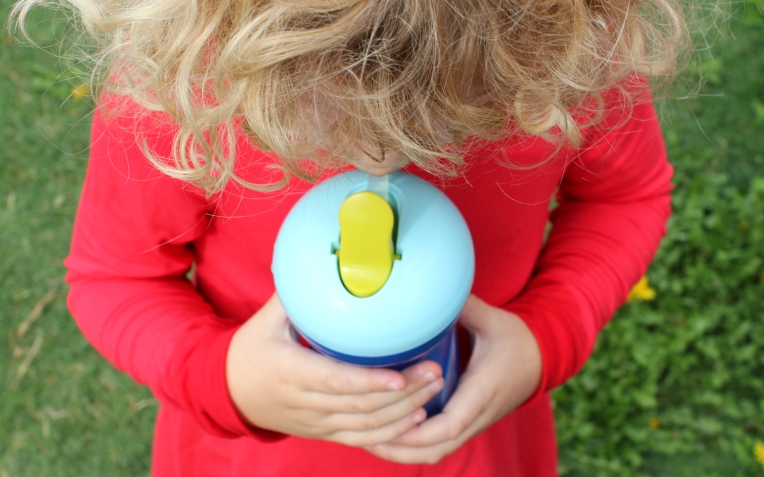We have spoken to many travelling families about the logistics of toilet training and dealing with bed wetting on the road and whilst it is a very common problem, it can make life difficult!

To help you enjoy your time away from home, we have compiled our list of top tips to help you get some shut eye, protect your mattresses and enjoy dry sheets (and kids) in the morning.
Here are our SIX TOP TIPS on staying dry!
Mattress protection

There are a variety of pads and covers available to protect your bed and pillow, (and
underwear pads that can be used for one off occasions – e.g. school camps, holidays,
sleepovers) but a good quality mattress protector that doesn’t leak is going to be a sleep (and sanity) saver whilst on the road.

We use the Signature® Tencel® Mattress Protector from Protect-A- Bed, which is made from odourless wood-based fibres, stays cool in summer and warm in winter. It is absolutely waterproof (and breathable) and has saved our mattress more than once! What we were impressed with was that the Protect-A- Bed is ideal for people with sensitive skin, rhinitis, or eczema. The range is approved by the National Asthma Council, Australia Sensitive Choice Program and Red Nose (Sids and Kids) as well as the Eczema Association and is Sensitive Skin Tried and Tested. Best of all you can machine wash them and throw them in the dryer.
Making the bed in layers will allow you to pull off the wet sheet / mattress protector
layer (if an accident happens) to reveal a dry, fresh sheet / mattress protector layer so that you can get back to sleep and deal with it in the morning.
Also, just as a side note – if you can’t wash due to your location- there are disposable mattress pads that you can buy to put in the top layer. However, it’s important to have a full length mattress protector on top of the mattress.
If you are wondering why mattress protectors are essential, here are some gross facts about your bed from Protect-A- Bed that will have you buying a mattress protector STAT!

- Humans sweat up to 1L of body fluid per night and lose millions of skin flakes each night. After 5 years, half the weight of a mattress can be made up of our own body fluids, skin cells, mould and bacteria that seep into our bedding. Pass me a bucket!
- Dust mites lurk in an unprotected mattress and are a major cause of asthma and allergies. As much as 30% of the population are actually allergic to dust mites – despite their tiny size, dust mites produce 10-20 waste particles per day!
Nappy or Pull-Up’s

If you are worried about laundry, and you’re only away for a short period then nappies and pull-ups are sanity savers! It is unlikely that a child will become dry wearing these, but they are perfect for hotel stays and accommodation where you don’t have access to washing facilities. A word from the wise, sometimes they leak so pop a mattress protector in your case so you don’t have to explain yourself to the hotel receptionist. Been there, done that!
Staying Hydrated

Drinking plenty of fluid throughout the day is very important for your child, and restricting the amount of fluid your child drinks in the evening is thought to be unhelpful and may even delay the process of being dry at night.
Bedwetting alarms
Bedwetting alarms are a useful and successful way to treat bedwetting, but may take 6 – 8 weeks to work. These alarms are available for hire from the Royal Children’s Hospital in Melbourne and other hospitals around Australia. You will need a referral from your GP to see a paediatrician before you can hire a bedwetting alarm.
Medications
Whilst most children with bedwetting do not need to take medication, there are some
occasions when it is recommended. You should talk to your doctor about a treatment plan for your child.
Encouragement and Motivation
It goes without saying that it is very important to be patient and to encourage your child.
Most importantly, punishing or making fun of a child for wetting the bed will only make the situation worse – be sure to explain this to brothers and sisters as well.
Some parents have great success with reward charts, others find it adds stress and causes disappointment to kids who are desperate to be dry and have no control over it. Charts alone have been known to have little success, but in combination with a bedwetting alarm can be useful.

We hope that you find these tips useful. Please make sure that if bedwetting is worrying you or your child then you should seek medical advice and grab yourself a mattress protector from Protect-A- Bed!
Good Luck and Happy Travels x
MORE INFORMATION
www.protectabed.com.au
Facebook: www.facebook.com/protectabedaus
Instagram: www.instagram.com/protectabedau
#ordinarymadeextraordinary #protectabedau


One thought on “Bed wetting and Toilet Training – Travelling Tips for Families”